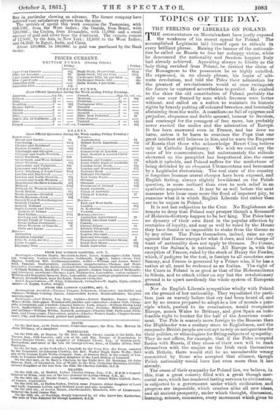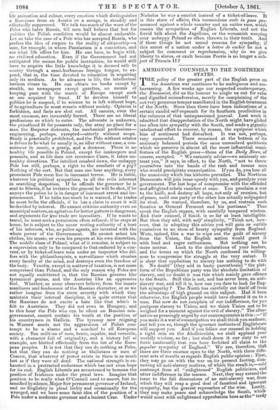TOPICS OF THE DAY.
THE FEELING OF LIBERALS ON POLAND.
THE commentators on Montalembert have justly exposed the weakness of his recent appeal for Poland. The accomplished Legitimist laid himself open to ridicule in every brilliant phrase. Raising the banner of the nationali- ties be called on Russia to free her unhappy victim, while he denounced the nationality and freedom happier Italy had already achieved. Appealing always to liberty as the holy thing ravished from Poland, he derided the claim of the Romagnese to the possession he so highly extolled. He expressed, in no cloudy phrase, his hopes of ulti- mate revolution, and told the Poles their admiration for the greatest of revolutionists would at once extinguish the future he ventured nevertheless to predict. He exalted to the skies the old constitution of Poland, probably the only one ever framed by man which freemen were better without, and called on a nation to maintain its historic rights by bravely putting off coloured breeches, and heroically abstaining from the waltz. A manifesto so full of epigram and prejudice, eloquence and feeble counsel, honour to freedom, and contempt for the youngest of free races, has probably never excited the smiles and the admiration of Europe. It has been answered even in France, and has done no harm, unless it be harm to convince the Pope that one great intellect still believes in him, and to warn the Emperor of Russia that those who acknowledge Henri Cinq believe only in Catholic Legitimacy. We wish we could say the same of his commentators, but unfortunately the ridicule showered on the pamphlet has bespattered also the cause which it upholds, and Poland suffers for the misfortune of being defended by an eloquent Ultramontane and bemoaned by a Legitimist rhetorician. The real state of the country is forgotten because unreal charges have been exposed, and English feeling, always slightly bewildered on the Polish question, is more inclined than ever to seek relief in an apathetic acquiescence. It may be as well before the next massacre lets loose once more the flood of impotent pity, to examine what it is which English Liberals feel rather than see to be unjust in Poland. It is not her subjection to the Czar. No Englishman at- tempts to deny that Poland may prosper though a Romanoff of Holstein-Gottorp happen to be her king. The Poles have no dynasty of their own fixed in the popular affection by centuries of loyalty, and may as well be ruled by the House they have found it so impossible to shake from the throne as by any other. The Poles themselves, indeed, raise no cry against that House except for what it does, and the charge of want of nationality does not apply to thrones. No throne, except the Sultan's, is national. All Europe is, with the exception of France, ruled by the stock of Henry the Fowler, which, if pedigree be the test, is foreign to all countries save Saxony, and France is governed by a Prince who, if he has a nation at all, must be reckoned as an Italian. The right of the Czars in Poland is as good as that of the Hohenzollerns in Silesia, and to attack either on any but the revolutionary ground is to upset needlessly the whole system of European descent.
Nor do English Liberals sympathize wholly with Poland on the ground of her nationality. They repudiated the parti- tion just as warmly before that cry had been heard of, And are by no means prepared to adopt as a law of morals a prin- ciple which, pushed to its conclusions, would reorganize Europe, annex Wales to Brittany, and give Spain an inde- feasible right to banker for the halt' of the American conti- nent. The Pole is scarcely more foreign to the Russian than the Highlander was a century since to Englishmen, and the composite British people are not apt to rely on antiquarians for their politics, or ethnologists for fitting subjects of sympathy. They do not affirm, for example, that if the Poles accepted fusion with Russia, if they chose of their own will to rank themselves with the empire as the Irish rank themselves with Britain, there would still be an unendurable wrong committed by those who accepted that alliance, though Polish nationality would have lost even more than it has already. The cause of their sympathy for Poland lies, we believe, in this, that a great country filled with a great though mer- curial race, which has rendered lasting services to civilization, is subjected to a government under which civilization and progress are impossible, which crushes alike all new ideas, and all ancient prosperity, under which thought, discussion, learning, science, commerce, every movement which gives to life animation and colour, every emotion which distinguishes a European from an Asiatic or a savage, is steadily and effectually suppressed. We talk too much of the woes of the Poles who hates Russia, till men half believe that but for politics the Polish condition would be almost endurable. Let us take the case of a Pole who has accepted Russia, who prefers the idea of empire to the reality of citizenship—a man, for example, in whom Panslavism is a conviction, and see what life offers for him. He can have, to begin with, no civilized education. Even if the Government had not extiriated the means for public instruction, he would still have to acquire the little knowledge it is deemed safe to convey through a semi-barbarous foreign tongue, to ex- pend, that is, the time devoted to education in acquiring only its medium. As he advances in life, the intellectual horizon closes in. He can obtain no books except by stealth, no newspapers except gazettes, no means of keeping pace with the march of Europe except such as are acquired by fraud. If he devotes himself to politics he is suspect, if to science he is left without hope, if to agriculture he must remain without society. Opinion is forbidden, and facts are shut out. All careers, even the most common, are inexorably barred. There are no liberal professions on which to enter. The advocate is unknown, the priesthood fit for peasants only, the army no place for a man the Emperor distrusts, the mechanical professions— engineering, perhaps, excepted—utterly without scope. Study is practically prohibited, and the Pole without estates is driven to be what he usually is, an idler without ease, a con- noisseur in music, a gossip, and a dreamer. There is no healthy life possible in Poland, except for innkeepers and peasants, and as life does not reverence Czars, it takes un- healthy directions. The intellect crushed down, the unhappy Pole has still, perhaps, a right to the comforts of a pig ? Nothing of the sort. But that man can bear anything, every prominent Pole must live in incessant terror. He is liable, whatever his political sympathies, to all the evils inherent in searching despotism. If he offends the governor he is sent to Siberia, if heirritates the general he will be shot, if he annoys the police he is in danger of incessant arrest and im- prisonment. If he talks too much he is warned, if he trades he must bribe the officials, if he has a claim in court it will be decided by interest. He cannot criticize authority even on municipal matters, an agitation for better gutters is dangerous, and arguments for free trade are incendiary. If he wants to travel, he must seek a permission often refused; if he stays at home, he is subject to the never resting authority of a host of his inferiors, who, as police agents, are invested with the whole power of the Government. He cannot select his clothes, his music, or even his prayers at his own discretion. The middle class of Poland, what of it remains, is subject to a supervision only to be compared to that endured by a con- vent, or by ticket-of-leave men under an inspector who dif- fers with the philanthropists, a surveillance which crushes every faculty of the mind, and destroys even the freedom of the body. Venetia, except in matters of taxation, is not more compressed than Poland, and the only reason why Poles are not equally embittered is, that the Russian governs like tyrannical genius, and the Austrian like an oppressive fool. Whether, as some observers believe, from the innate manliness and ionhommie of the Russian character, or as we rather imagine from the stern severity with. which they maintain their internal discipline, it is quite certain that the Russians do not excite a hate like that which is felt to Austrians. They did not even in Hungary, and to this hour the Pole who can be silent on Russian mis- government, cannot contain his wrath at the position of his countrymen in Gallicia. The tyranny now reigning in Warsaw needs not the aggravation of Polish con- tempt to be a shame and a mischief to all European society. Ten millions of men, brave, capable, and versatile, with a character full of originality, and a history full of example, are blotted effectually from the list of the Euro- pean peoples. It is not that they can do nothing as Poles, but that they can do nothing as Gallicians or men of Cracow, that whatever of power exists in them is as much lost as if they were all dead. The national strength is ex- hausted in a protracted endurance which has not even hope for its end. English Liberals are accustomed to bemoan the position of Irishmen under the penal laws. Imagine that position to be really what O'Connell used to assert, but in- tensified by silence, Major Sirr permanent governor of Ireland, and no Englishry to plead feebly and occasionally for the wronged, and we have some faint idea of the position of a Pole under a moderate governor and a lenient Czar. Under Nicholas he was a convict instead of a ticket-of-leave. It is this state of affairs, this tremendous vade in pace pro- nounced against a whole country and an entire race, which rouses the sympathies of English Liberals, and not the fervid talk about the jagellons, or the womanish weeping over unhappy Poland so often thrown in their teeth. And if these things be not sound reasons for sympathy, if this arrest of a nation ,under a lettre de cachet be not a subject for comment or reprehension, why do we give liberty to slaves, or exult because Poerio is no longer a sub- ject of Francis II ?































 Previous page
Previous page